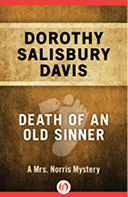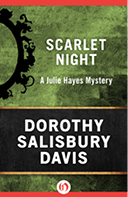Enemy and Brother (33 page)
Authors: Dorothy Salisbury Davis

I watched only Margaret. I saw her reach for her husband’s hand and clasp it tightly. She did not look at him or anyone else. It was now a matter of facing up, of the long beginning again, as she would be reckoning it, the simulation of shock, the consolement of Braschi, whom I suspected to be a man of honor. In a way, I thought, it was a pity to have to use Webb’s diary. To leave her as she now supposed herself, seemingly deceived and having to play it out, perhaps for years, would be a kind of punishment for a woman who had tuned her beauty and her talent to their perfect pitch. She was like a singer about to come onstage only to find the orchestra putting away its instruments and going home.
Paul stood like a rock until the murmurous shock subsided. And Frontis stood, his arms folded, a little smile on his lips.
“By command of Demetrios, whom you know as Frontis, I was blinded. By his own hand was this unfortunate deprived of the tongue God gave her….” He pushed Maria forward and she, poor simple one, opened her mouth and did a macabre little step and bow so that women moaned to see her, and the Princess’ hand went to her own mouth in horror.
“Our crime was the danger of our bearing witness against him.
“His crime, the murder of a friend of Greece: it is of this I would accuse him now. I will leave treason to those who understand it.
“As neither the woman nor I could have testified without him, there is another who was present and is with us here. I have no wish to prolong this confrontation longer than I need to convince you of the necessity to apprehend the murderer now, Your Highness, and to safeguard us, the people’s humble witnesses.
“By his military record Colonel Frontis was taken prisoner of war by the Nazis, interned in Auschwitz, charged by the Soviets with Nazi collaboration, and held until 1951. But, Your Highness, we, your witnesses, know him, as Demetrios, to have been with the insurgent leader, Markos, not many miles from here in 1948.
“And the man of whose murder we accuse him left documentation of this dual identity which we now give into Your Highness’ hands.”
I gave the package to Maria to give to the Princess and took Paul’s arm as well as hers. There was, Elsa told me afterwards, a considerable clamor and moving forward, as though with the three of us, of the now murmurous people who suddenly seemed to have felt all along that there was in Frontis a hidden perfidy. Elsa thought the growing temper dangerous. I would not have known. My concentration on getting the business over with was too intense. It was a long walk, those few steps, and there was at the end of it such a beautiful irony: Maria tried to give Webb’s journal to Margaret, who finally took it in her hand and passed it to the Princess.
The Princess did not open it. She spoke to the man beside her, the General to whom Frontis had introduced Elsa and myself. He got up and taking Frontis by the arm moved quickly to the gate, several of the security police falling in behind them.
“We shall investigate,” the Princess said, looking at me. She was pale and severe, but utterly composed. “And before you leave this house, we shall provide what protection may be necessary.”
We drew back, Maria and Paul on either side of me. I did not look at Margaret. I feared to see an ancient face to have replaced the mask of beauty.
I
WRITE THIS IN
my office at the university, having finally put away the Byron book which I am not able to write. I hope to go back to Kaléa this summer, and perhaps there take it up again. I have been home for several months.
The trial of Alexis Frontis was brief, as brief as my own, although its preparation took somewhat longer. He was tried for treason by military court martial, convicted and shot.
No charges have been made against Margaret. There is no evidence save Webb’s letter to me and that, by legal measure, is insufficient without corroboration. Frontis denied the connection, admitting only that they had met in Iran as Webb alleged, when both were Russian internees. He also denied having killed Webb, and defied the court to call the tongueless woman whose sometime madness even the nuns admitted. He denied giving Paul the gun… and bade the court examine the trial records at the time of Webb’s death.
So in the end he was convicted by my testimony to his presence in Markos’ camp in 1948.
I have said I hope to go back to Kaléa. Shall I be admitted to the Kingdom of Greece? I wonder.
I have letters from Paul written in Michael’s hand. Maria returned to the nuns, but that was even before Frontis went to trial. Paul speaks of when we shall visit her.
Elsa will be here this spring for the publication of her latest novel. Shepherd is again “iffish” about making the trip so that I am looking forward to her coming.
The twenty-first of February, the anniversary of Epirot independence, has come and passed in joyous peace.
I have been sitting here tonight wondering if I should return the money to the American foundation sponsoring my Byron research. I have decided against it. They have had their money’s worth. How I came to realize it: several weeks ago when I was working on this—shall I call it novelized journal?—I remembered something Margaret said that night as we were going in from the balcony. She said, “One wonders then who sent you here.” I have since queried my sponsors and the chancellor of the university, and I have made a belated discovery which you will perhaps have anticipated: my grant was government-approved.
Dorothy Salisbury Davis is a Grand Master of the Mystery Writers of America, and a recipient of lifetime achievement awards from Bouchercon and Malice Domestic. The author of seventeen crime novels, including the Mrs. Norris Series and the Julie Hayes Series; three historical novels; and numerous short stories; she has served as president of the Mystery Writers of America and is a founder of Sisters in Crime.
Born in Chicago in 1916, she grew up on farms in Wisconsin and Illinois and graduated from college into the Great Depression. She found employment as a magic-show promoter, which took her to small towns all over the country, and subsequently worked on the WPA Writers Project in advertising and industrial relations. During World War II, she directed the benefits program of a major meatpacking company for its more than eighty thousand employees in military service. She was married for forty-seven years to the late Harry Davis, an actor, with whom she traveled abroad extensively. She currently lives in Palisades, New York.
All rights reserved, including without limitation the right to reproduce this ebook or any portion thereof in any form or by any means, whether electronic or mechanical, now known or hereinafter invented, without the express written permission of the publisher.
This is a work of fiction. Names, characters, places, events, and incidents either are the product of the author’s imagination or are used fictitiously. Any resemblance to actual persons, living or dead, businesses, companies, events, or locales is entirely coincidental.
Copyright © 1966 by Dorothy Salisbury Davis
Cover design by Tracey Dunham
978-1-4804-6060-7
This edition published in 2014 by Open Road Integrated Media, Inc.
345 Hudson Street
New York, NY 10014












